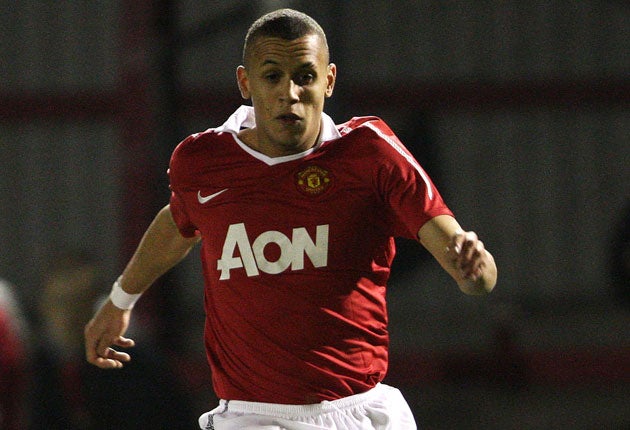Scholes: United's new generation can be the best since class of '92

Paul Scholes has suggested that last season's Manchester United Youth Cup winning side looks the most promising since the fabled group of the early 1990s and can deliver three players to the first team within a year, with Ravel Morrison the lead contender for the leap which so many 18-year-olds fail to make.
Morrison has created far more of a stir outside of football than within, with a judge in Salford last week reactivating a referral order for the teenager which he had lifted in error, and Scholes' belief that Sir Alex Ferguson might take the teenager in the United party which departed on tour to the United States yesterday has not come to pass.
But Scholes, who will begin a United coaching role in September and predicted last July that Javier Hernandez would immediately score heavily for the club, revealed that Morrison has already started training with the first team and is surprised by the physical strength which he allies to his talent. "We've trained with Ravel and we know what talent he has got – hopefully," the 36-year-old said.
Scholes believes the tenacious Ryan Tunnicliffe, a player in his own mould who has been sent on loan to Darren Ferguson's Peterborough, and the young French midfielder Paul Pogba might also make the first team in the next two years. He sees United's tenth FA Youth Cup final win, over Sheffield United earlier this summer, as potentially the most significant since the 1992 win over Crystal Palace which delivered a generation that underpinned the club's domestic dominance.
United have won the FA Youth Cup only once since the Neville/Butt/Beckham generation clinched it in 1992 and 1995 and none of the 2003 side, who triumphed over Middlesbrough, made it at the club. "We have struggled a bit in the Youth Cup [since 1992] haven't we? But this group look like they're ready to go into a first team now because they are big, strong, powerful lads and they have got the skill to go with it. They like to work hard as well, which they are going to need. I thought they were brilliant and they looked like men already. They didn't really look like kids because they are built so well. They are strong physically and have got the talent to go with it."
Morrison's latest court appearance last week revealed more signs that his behaviour might finally be coming under control. He was before District Judge Jonathan Finestein, whose earlier decision effectively to remove a 12-month referral order in Morrison's case was challenged by the family of a youth whom earlier in the year he was convicted of intimidating.
The judge's decision to reinstate the referral order meant that he had to lift a £600 fine imposed on Morrison for criminal damage, arising from a row between the player and his girlfriend. But Morrison declined to accept the money and instead asked for it to be donated to the Royal Manchester Children's Hospital.
The judge said he had been handed a "glowing" report from the youth offending team explaining that the footballer was making progress with "anger management" and "maturity" problems. The judge concluded that "everyone was in agreement that the referral order was working. This young man does have difficulties. He needs support with anger management and maturity."
The latest court outcome will come as a relief to United and the Football Association, for whom Morrison is potentially an important part of the future England set-up. Morrison had been told in January by another district judge, Wendy Lloyd, that following the witness intimidation case he would be locked up for a year if he was convicted of another offence before the end of 2011.
Scholes pointed out that it was harder making the first team these days than the early 1990s, though. "The difficulty for them these days is that squads are so big aren't they – 22, 23, 24 in a squad and it is difficult. When we were coming you had only 16, 17, 18 and it is more difficult but if they are good enough there's no doubt the manager will use them," he said.
But Ferguson suggested in Boston last night that the next Scholes may come from the youth ranks.
"It is impossible to get another Paul Scholes," he said. "But if we get a player along similar lines in terms of the quality of his passing and vision, we would have to do something. The difficulty is, if you picked the best four midfield players in the world, Scholes would be there with Xavi and Andres Iniesta. Then you could take a pick from somewhere else. It is a loss. How do we overcome it? The next few weeks could help us in that respect. Someone could emerge out of the youth team and we carry on."
Subscribe to Independent Premium to bookmark this article
Want to bookmark your favourite articles and stories to read or reference later? Start your Independent Premium subscription today.

Join our commenting forum
Join thought-provoking conversations, follow other Independent readers and see their replies